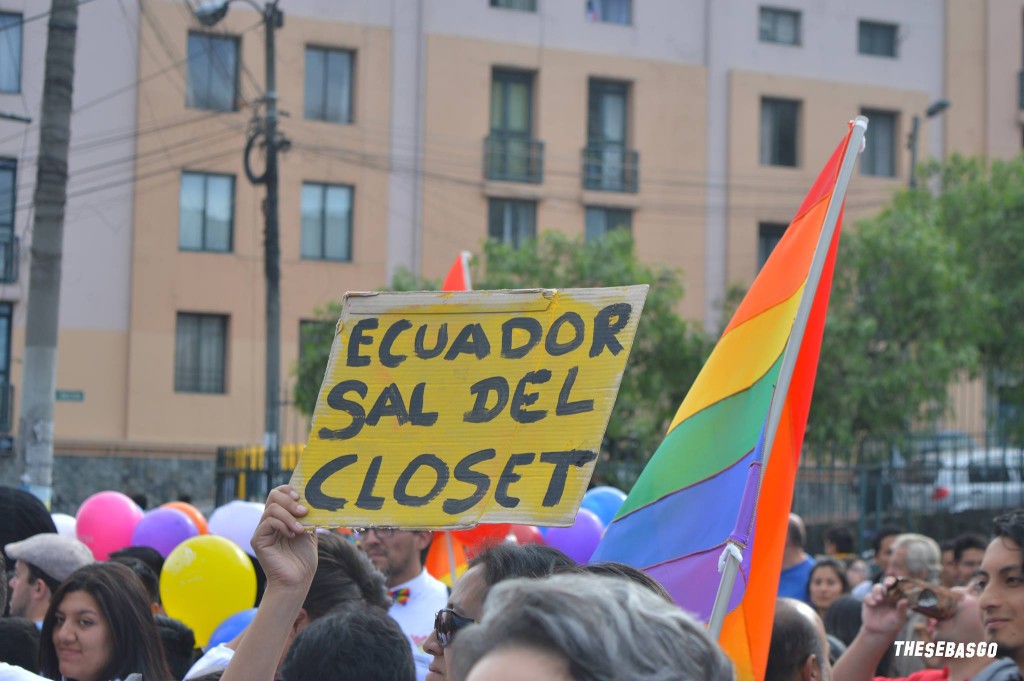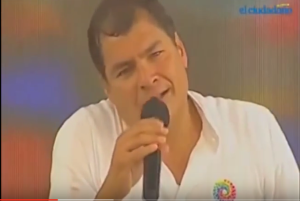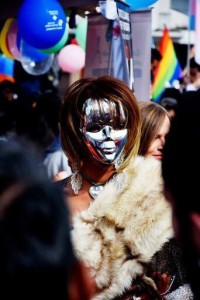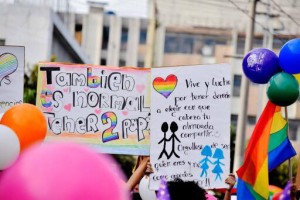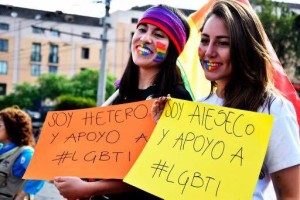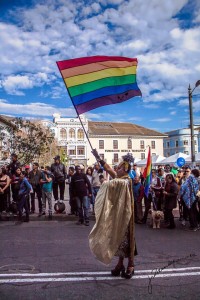By María Amelia Viteri* and Gabriel Ocampo*
Homosexuality was criminalized in Ecuador until November, 1997 [1] . Consequently, lesbian, gay, bisexual and transgender persons were considered criminals, could face imprisonment and were often tortured and even killed. Though this legislation was later declared unconstitutional [2] sexual and gender diversity has not been fully accepted culturally or socially by most Ecuadorians, who still consider it a deviation or a disorder.
In 1998, a new constitution mandated protection for discrimination based on sexual orientation[3], giving grounds for activist and social organizations to consolidate their advocacy around some important issues that, to some degree, would be later reflected in the current Constitution of the Republic, approved in 2008. For example, protection against discrimination based on gender identity was included in the criteria against discrimination[4]; the state was required to take all measures to reassure full equality for LGBT people and adopt a gender approach in public policy and public services[5]. Hate crimes were condemned and new legislation was put in place to make them punishable under the law[6].
Equally important was the recognition of new liberties and rights such as the right to self-determination, the ability to make informed sexual and reproductive health decisions and access sexual and reproductive health care without parental consent; the right to have a personal identity recognized by society; the freedom for same-sex couples to form partnerships and families; access to social security benefits; access to formal and material equality, among others[7]. This, however, was contradicted by two provisions adopted in the same Constitution, which barred same sex couples for getting married or adopting[8], halting the advancement of family rights for LGBT people and hindering improvements in laws and policies to secure fully access to rights, services and opportunities, as well as the implementing of longstanding measures to fight discrimination.
The following chart illustrates the legal framework currently governing sexual policy and other human rights issues for LGBT people in Ecuador:
| Legal body | Year | Main issues |
| Health Code 2006 | 2006 | · Grants health care access free from discrimination |
| Constitution of the Republic | 2008 | · Affirmative action· Proscription of discrimination and hate
· Broad recognition of sexual rights · Gender approach in public policy and services · Same-sex partnerships and family · Bars same-sex couples from marriage and adoption |
| Electoral Code | 2009 | · Forbids behavior contrary to the Constitution |
| Communications Law | 2013 | · Forbids broadcasting messages of hate· Establishes economic penalties |
| Criminal Code | 2014 | · Punishes different kinds of hate behavior· Sanctions go from 1 year to 26 years of prison |
| Civil Code[9] | 2015 | · Includes same-sex partnerships· Retains heterosexual presumption of parenthood |
| Identity Law | 2016 | · Allows change of gender and name· Marks it differently from sex in the identification document
· Uses biological criteria to bar same-sex parenthood |
During the ten-year tenure of former Ecuadorian President, Rafael Correa — who championed the establishment of a new Constitution and the revamping of state led policies — a marked tension between the constitutional progressive stand on human rights and liberties, and the President’s morals and prejudice was made evident. On one occasion, he openly stated that gender norms are biologically determined (as male and female) and that homosexuality is a barbarism that hurts the nuclear family. He went further to openly confront what he portrayed as gender ideology[10]. In doing so, he took a moral stance claiming that “gender ideology” destroys the family and does not withstand the scrutiny of credible academic analysis.
The President’s personal position on these matters led to much passivity and indifference on the part of the state apparatuses in respect to accomplishing the constitutional advancements, as to materialize rights and address key policy issues raised by social movements, such as: protection against discrimination and violence, same sex marriage, family diversity rights, labor and education rights, and the investments on specific social studies to ensure accurate policy development[11]. Thus, only in 2013, the National Statistics Office made a first study on living conditions of LGBT people[12], and that same year, the former President hosted a round table on LGBT issues with the participation of leading activists and organizations and also of the Ministers of Justice, Health, Education, Labor as well as the Ombudsman, the State Prosecutor, the Director of the Civil Registry. The priorities set at the meeting suggested that from there on it would be possible to begin working on sustainable policies in these domains. The activists present at the round table raised several claims concerning the government’s non-compliance with the Constitution and international human rights standards in many areas, such as the full recognition of same-sex partnerships and gender identity rights. As a result, regulations were put in place to prevent notaries from refusing to grant licenses for same-sex partnerships or the Civil Registry to register them. These regulations also ensured welfare benefits for same-sex couples as they were previously granted in 2011[13].
While these developments appeared to be going in the right direction, they also presented a number of caveats. For example, rules then put on place forced couples entering into same-sex partnerships to keep in the books their previous (heterosexual) marital status; furthermore, the these were also registered in a different records from those registering heterosexual married couples. At the National Assembly, when the debate on gender identity bill was revived, the short-sided understanding of lawmakers in respect to difficulties faced by trans people emerged. The gender identity law establishes that change in social identity is just allowed for people over 18 and that while in the national identity card, gender and name can be modified; the gender is marked differently from the sex in the card and the ‘original sex’ is kept intact in the Civil Registry records, disclosing the previous identity of trans people to potential employers, health care providers, teachers and other public officials, leading to discrimination.
Conflicting dynamics have also erupted at the cross road between political ideologies and sexual rights politics, particularly because of the interests of certain LGBT groups to gain political power. For example, the group led by transgender (male-to-female) activist, Diane Rodríguez[14] who is a member of Alianza País — President Correa political party — openly aligned herself with the goals of the administration, contributing pulling waters to the image of sexual modernity the government wanted to project even when, internally, many problems and contradictions were at play. This conjuncture or paradox is not exclusive of Ecuador, but rather reflects the global trend observed elsewhere of LGBT rights being manipulated by states as to portray their commitment to ‘political modernity.” In other words, there are times when often see heteronormative states adjusting to LGBT politics to pursue their own interests[15]. In the case of Ecuador, in particular, it was quite striking to witness the state engaged in the response to and normalization of “trans” identities at the same time that it was doing its best to accommodate the claims of religious forces that engage in politics to impose binary gender norms. These conflicting agendas indicate that LGBT rights are constantly caught by the webs of political maneuvering, which make it difficult to properly evaluate the effects of positive legal reforms[16].
This can be sharply illustrated by the fact that exactly right after voicing his approval of the new identity law, former President Correa stated in his weekly national broadcast[17] that only two sexes – man and woman – and two genders – male and female – exists. He also stated that marriage can only be held between a man and a woman, and that only heterosexual couples can adopt. On previous occasions, he had threatened to resolve the claim to same-sex marriage and adoption by means of a national referendum.[18] He had also admonished certain groups and individuals advocating for LGBT rights, threatening them with exclusion from participating in the spaces created by the government.[19] In contrast, activists and organizations aligned with the regime were getting key positions in policy platforms for the LGBT agenda, as it is the case of the Executive’s Gender Commission or the Legislative’s Committee on Decentralization, where the gender identity bill was being debated.
These modalities of political operation were not confined to the Executive Branch. The Judiciary was also close attuned with the President’s rhetoric. In a number of key decisions regarding same-sex marriage and same-sex parenthood issued by the courts, constitutional and international obligations to adopt a progressive stand in respect to the matter, were dismissed and obscured with references to marriage from the Bible[20], outdated presumptions of heterosexual parenthood and moral stances on same-sex parenting[21]. These obstacles did not stop, however, non-aligned LGBT activisms from continuing advocating in many areas such as the reform of the Civil Code[22] , or to criticize what they perceive as the normalization of double standards in policy making that jeopardize their rights and freedoms.
Eventually, the best example to illustrate the depth of systematic discrimination against LGBT people is the case taken to the courts by a lesbian couple in 2012, after not having been able to register their daughter with their family name. The Civil Registry not only ignored the constitutional rule that grants same-sex couples the same rights as heterosexual ones to constitute families and enjoy all the guarantees for their recognition and security. Rather it denied the child the right to be registered, to have an identity document and to be considered as part of a family. The Civil Registry personnel has even suggested the couple to register their daughter as if she was the offspring of a single mother and, when the case was taken to the courts, it defended this view affirming that that it aimed at “preserving the affiliation of the child to her father “[23]. Yet more problematic, the courts sustained the Civil Registry’s argument and the denial of rights and access to justice to the family, that has been waiting for more than three years for a final ruling on their case by the Constitutional Court of Ecuador. [24]
LGBT rights in the area of health have not been fully addressed or accounted for in recent Ecuadorian policies. Since Ecuador’s Health Code was passed in 2006 — two years before the new Constitution was approved — no significant developments regarding LGBT health rights have been adopted. Although the Health Code declares that access to health will be free from discrimination, it fails to lay down clear guidelines for affirmative action measures and it does not include definitions in respect to comprehensive health care to respond to the demands of gender and sexually diverse people. Even in 2013, indicators showed that LGBT people experienced discrimination, exclusion and violence in the health system. (See footnote after item 24.)
Legal stagnation in this realm has led to a short-sided response to demands made by the LGBT community. The Ministry of Health has not been able to define consistent and long term plans in that regard. For example, it was only in 2012, after a national and international outcry regarding human rights violations, that a first regulation to forbid conversion therapies and control the activities of rehabilitation centers was adopted. More detailed information on what happens in these facilities is offered further ahead.
Ten years have elapsed after the approval of the Health Code and the Constitution for the Ministry of Health to begin implementing protocols on sexual and reproductive health care for LGBT communities. Finally, in 2017, protocols have been adopted that constitute an important step towards securing access to health for LGBT people, free from discrimination, respectful to personal and sexual beliefs and expressions, safe, private and specialized. However, these norms continue to be isolated measures in contrast to the integrity that the Constitution requires and are hardly held accountable in private facilities.
One key obstacle hindering policy implementation in the health sector is that its institutions are deeply pervaded by biological, heteronormative and gender binary assumptions that translate practices of disciplining and reinforcement of the dominant sex and gender order. Shadow Reports presented at the 2009 and 2016 UN Human Rights Council Universal Periodical Review sharply underline how in the Ecuadorian cultural imaginary, gender identity and sexual orientation are viewed as fundamentally biological and heteronormative. Even today, many Ecuadorians will resort to violence to reinforce traditional gender norms and sexual roles.
Indicators also show how violence affecting LGBT people reflects a marked intersection of race/ethnicity, sexual and gender identity, socio-economic and health status. According to a 2013 study conducted by the Ecuadorian Census Bureau, 70.9 percent of LGBT respondents claimed to have had experienced control, rejection or violence in familiar spaces; 55.8 percent of them in public spaces and 27.3 percent of respondents were subjected to violence perpetrated by public officials. Among the latter, 94.1 percent reported having been insulted, mocked and threatened and 45.8 percent to have been illegally detained[25]. Violence against LGBT people frequently goes unpunished because victims are afraid to report crimes, as they do not trust the police or the justice system and fear retaliations. In the study cited above, only 8.3 percent of respondents in have reported the violations. More importantly, violence against LGBT people is not considered a relevant issue by the authorities; in fact, there are little to no statistics on hate crimes reported by the State Prosecutor’s office or in the courts. Law enforcement in Ecuador is not trusted by the LGBTI population, as police abuse and torture of homosexuals are so common that it is almost expected according to the accounts of “gay-bashing” reported during personal interviews with gay Ecuadorian men during the last 10 years. LGBT people suffer violence on a daily basis in Ecuador including bullying, discrimination, poor treatment, beatings, “corrective rapes” and killings.
In that respect, another key area to be looked at is the above mentioned ‘conversion clinics’. Regional and national organizations such as CLADEM, CEDHU, Causana have denounced the existence of a large number of so-called “rehabilitation centers” that offer services to “cure of homosexuality”. These facilities operate surreptitiously, interning and treating people against their will. The illegal operations of the “rehabilitation centers” include kidnapping, forced use of illegal substances, neglect, torture and sexual abuse[26]. Notwithstanding these regional human rights organizations have filed writs of habeas corpus demanding the release of the LGBT “patients” from this unlawful detention centers.
Anthropologist Annie Wilkinson (2013)[27] reported the existence of over 200 clinics for ‘dehomosexualization’ in Ecuador. Loosely-regulated as rehabilitation centers for alcohol and drug addiction, these clinics sell themselves and services that fix ‘conduct and behavioral disorder.’ Some of them emerged before regulations were established in the 1970s, but that majority proliferated from 2000’s onwards and this indicates that the demand for coercive and aggressive therapy to “fix” what society perceives as sexual and gender transgression is growing. Many of those interned are women perceived as having gender dysphoria. Some of the professionals involved in these clinics are public health and justice officials themselves. The methods used in these clinics qualify as torture according to the parameters of the International Convention Against Torture.
The shocking reality of these conversion-torture centers for LGBT sharply illustrates the degree of homophobia and transphobia in Ecuadorian society. It also highlights the extremely permissive attitude on the part of both state and society regarding the violation of the rights of fully capable adults. While the concept of freedom is enshrined in the Constitution, laws and regulations, in daily life, law enforcement and citizens, in general, fail to understand the true meaning of these principles [28].
The number and effect hate crimes perpetrated against the LGBT population as well as the daily abuse and rejection they face cannot be overlooked. Although the state has made legal reforms to punish discrimination, hate and violence[29], enforcement remains weak. Attitudes of contempt and hate are quite common and are expressed by the most diverse actors including priests[30], political actors, media and private offenders. Exemplary sanctions have been scarce and totally dependent on the intervention of activist and organizations to push for administrative, electoral and judicial authorities in order to achieve significant results. In thousands of cases of violence in relation to which allegation of hate motivations have been made, many have been discarded for lacking arguments or evidence and very few have been adjudicated. For example, in 2013, the Electoral Tribunal suspended the political rights of a former presidential candidate who made offensive and discriminatory declarations against LGBT people during his campaign[31]. Since the Communications Law was enacted, the competent authority has also sanctioned a number of media outlets for offensive and discriminatory content. Since 2014, the Constitutional Court has also stated that pejorative expressions, even those that are socially accepted, need to be considered as hate speech and as part of hate crimes[32].
While the 2008 Constitution projects a potentially positive prospect for LGBT rights and sexual and gender diversity more broadly, this is very far from what has been developed. A handful of cases recently settled in international courts show clearly that the country has not yet fully understood its human rights obligations for LGBT people. Furthermore, as seem above, contradictory constitutional provisions and the views of political leadership has also had a negative impact overall on LGBT issues.
In 2017, Ecuador elected a new president, Lenin Moreno, who was Rafael Correa’s Vice President. Not surprisingly, President Moreno has already expressed his support for the previous administration’s conservative views and policies, stating that he will maintain the Constitution’s articles regarding same-sex marriage and adoption. [33] Even so, during the campaign, President Moreno decided to sign an open letter of commitment to LGBT issues after the right-wing conservative candidate, Guillermo Lasso, announced that he had held conversations with independent LGBT activist and organizations. Yet it should be noted that neither candidate took a firm stance on these matters.
On the other hand, it is noteworthy that within a month of President Moreno’s inauguration, the struggles for the rights of the LGBT population were already made visible with positive responses on the part of the state. For example, the current government recently approved a regulation against all forms of discrimination in work places. As we finish writing this article, the Palacio de Carondelet is lit with rainbow colors for the first time to honor International Pride Month and the 20th year anniversary of the decriminalization of homosexuality in Ecuador. With this symbolic gesture, Quito joined many other important major cities around the world as a sign of respect for the LGBT communities. However, symbolic gestures do not necessarily translate into progressive legislation. The full participation of LGBT people in decision-making processes, regardless of their political affinity, is as needed as non-discriminatory policies, discourses and practices.
* María Amelia Viteri holds a Ph.D. in Cultural Anthropology from American University in Washington D.C. and is currently a Professor of Anthropology at University of San Francisco de Quito (USFQ) at the School of Social Sciences and Humanities.
* Gabriel Ocampo has a B.A. in Law from Universidad San Francisco de Quito with a Minor in Philosophy and Arts, and a M.A. in Political Management at the Universidad Autónoma de Barcelona. He has been the legal adviser of Ecuador’s LGBTI Working Group.
Images
Photos LGBTTI Pride Parade Quito 2017 by Sebastian Molina (1), Gerardo Martinez (2,3,4) y Jose Zambrano (6)
“Rehabilitation center”: art documentation by Paola Paredes
__________
Notes
[1] Criminal Code of Ecuador, 1986. Article 516.
[2] Constitutional Court, sentence No. 111-97-TC. November 25th,1997
[3] Constitution of Ecuador, 1998, Art. 23.3.
[4] Constitution of the Republic of Ecuador, 2008, Art. 11.2.
[5] Ibid, Art. 32,70.
[6] Ibid. Art. 81.
[7] Ibid. Art. 66.
[8] Ibid. Arts. 67, 68.
[9] The approach and the text have barely been unaltered since it was first written in the early 20th century, although its latest reform was made in 2015. This latter seek to adapt it to the Constitution but was later blurred by some provisions of the gender identity law, that are still to be constitutionally reviewed.
[10] Presidency of the Republic of Ecuador, national broadcast: Enlace Presidencial 354, December 28th, 2013
[11] LGBT 2014 Agenda: “Agenda pro derechos de las diversidades sexo-genéricas del Ecuador” April 10th, 2014.
[12] Instituto Nacional de Estadísticas y Censos: “Primera investigación sobre condiciones de vida e inclusión social de población LGBTI en Ecuador” (Ecuador’s Census Bureau: “Research Report on the Life Conditions and Social Inclusion of the LGBTI community in Ecuador”) http://bit.ly/13CoUfJ
[13] As in the case of J.P.’s claim for pension and unemployment benefits in 2011, widow of female T.A. http://bit.ly/2rtFgDe.
[14] Diane Rodriguez was elected in 2017 as a surrogate member of the House of Representatives, which implies that she could only act if the main representative allows her.
[15] See Viteri, María Amelia; Picq, Manuela. 2015. Queering Narratives of Modernity, Peter Lang: Oxford.
[16] 2016 Shadow Report
[17] Presidency of the Republic of Ecuador, national broadcast: Enlace Presidencial 354, December 28th, 2013
[18] President of the Republic of Ecuador, twitter: http://bit.ly/2sN321b.
[19] 2016 Shadow Report
[20] Ruling of Pichincha’s Provincial Court Special Unit on Family No. 2013-20843-CC.
[21] Ruling of Pichincha’s Fourth Judge on Criminal Affairs No. 2976-2012-FA.
[22] Reformatory law to the Civil Code, 2015.
[23] Ruling of Pichincha’s Provincial Court Special Unit on Criminal Issues No. 0223-2012.
[24] Ruling on admissibility of the Constitutional Court, case 1692-12-EP http://bit.ly/2t1nZ6c
(footnote after item 24) Instituto Nacional de Estadísticas y Censos: “Primera investigación sobre condiciones de vida e inclusión social de población LGBTI en Ecuador” (First investigation on the life conditions and social inclusion of LGBTI people in Ecuador).
[25] Ibid.
[26] Fundación Ecuatoriana Equidad, 2014, Report on the situation of human rights of LGBTI people.
[27] Wilkinson, Annie, 2013, Sin sanidad, no hay santidad: las prácticas reparativas en Ecuador, FLACSO-Ecuador.
[28] Shadow report 2016 and http://bit.ly/2dLJ54y.
[29] Electoral Code of 2009; Communications Law of 2013; and Criminal Code of 2014.
[30] Declarations made by Catholic priest “P. T.” in May 2012 was reported by the media: http://bit.ly/2thGJho.
[31] Declarations made by pastor and presidential candidate N.Z. during the 2013 campaign was also reported in media: http://bit.ly/2tlgLfp
[32] Ruling on the merits of the Constitutional Court No. 136-14-SEP-CC in a case concerning racial discrimination.
[33] As reported in media: http://bit.ly/2s7PKJ4

